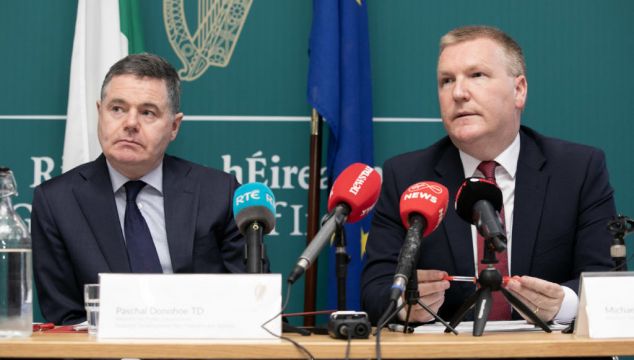Additional report by Reuters.
An Exchequer surplus of €1.2 billion was recorded in 2023.
The figure is a decline of €3.8 billion on the surplus recorded in 2022, with growth in tax revenue offset by several factors, including increased public expenditure as well as the transfer of €4 billion from the Exchequer to the National Reserve Fund.
Tax revenue in 2023 was €88.1 billion, an annual increase of €5.0 billion (6 per cent) and in line with Budget 2024 projections.
Income tax receipts of €32.9 billion were €2.2 billion (7.1 per cent) ahead of 2022, reflecting the strength of the labour market.
Corporation tax receipts of €23.8 billion were €1.2 billion (5.3 per cent) up on 2022, more modest growth than in recent years.
VAT receipts in the year of €20.3 billion were up by €1.7 billion (9.4 per cent) on the previous year.
Total gross expenditure in the year amounted to €94.7 billion, €5.9 billion (6.9 per cent) ahead of last year.
Commenting on the figures, Minister for Finance Michael McGrath said: "The end-year figures show an Exchequer surplus of €1.2 billion in 2023. Tax receipts came in largely as anticipated and reflect the underlying strength of our economy, especially the labour market.
"It must be acknowledged, however, that the budgetary surplus includes windfall corporation tax receipts which, if excluded, would result in an underlying deficit.
"In this regard, it is important to stress the more modest growth rate in this revenue stream over the past year as well as the inherent volatility in these receipts."
The Minister added: "Indications are that pandemic-era surge in exports in a small number of sectors – which drive corporate profitability in Ireland – are now unwinding; this would mean more modest growth in corporation tax receipts in the coming years.
"These developments underscore the importance of ensuring that permanent fiscal commitments are not made on the basis of transitory revenues.
"The establishment of the two new-long term savings vehicles (the Future Ireland Fund and the Infrastructure, Climate and Nature Fund) will allow us to prepare for future structural challenges while limiting our exposure to volatile windfall revenues."
Meanwhile, the annual inflation rate climbed to 3.2 per cent in December from 2.5 per cent in November, a flash estimate of the Harmonised Index of Consumer Prices (HICP) showed on Thursday.
The core HICP rate, excluding energy and unprocessed food, was estimated at 4.3 per cent in the year to December, up from growth of 3.9 per cent in the year to November.







